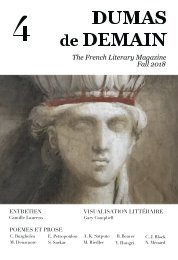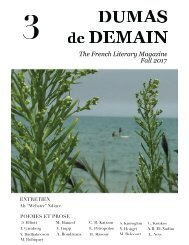Dumas de Demain: The French Literary Magazine Vol. 7
Create successful ePaper yourself
Turn your PDF publications into a flip-book with our unique Google optimized e-Paper software.
thinkers, and other folks do.
4. In Chapter 5, Anselm's argument presents God as a somewhat
contradictory being while arguing the similar noncontradiction of
his existence. In fact, some faiths understand the concept of God
as being everything and nothing, both joined and disjointed, similar
to the construction of the Amphisbeton mentioned in the previous
chapter. Do you think that Amphisbeton could be the idea of God,
or some supernatural, superhuman entity responsible with creation
and destruction? Similarly, do you think that the Aristotelian
principle of noncontradiction could serve as a justification for
religion, as a "science" which investigates being as being and the
attributes which belong to this in virtue of its own nature?
This is a question for a better philosopher and theologian than I am.
Amphisbeton, in Metaphysics IV, is a contradictory figure, in both the
narrow sense and the large sense I distinguished in my previous
answer. He is called into existence only to demonstrate the
impossibility of his existence, but once created in the text, he
becomes (in my reading) a liminal, indispensable figure of opposition
and contradiction in the large sense. When I worked on Logical
Fictions, I did not think of the opponent in Aristotle or Anselm as a
figuration of God. I thought of it as a fictional tool used to refute
something (sophistry for Aristotle, and atheism or other religious
negationism for Anselm). I still view it as representing human
limitations and possibilities rather than a divine being. Perhaps the
Opponent of the Opponent would be God?
Your last question is also hard to answer. Does the principle of noncontradiction
lead to an affirmation of the necessity of God's
existence as Anselm's ontological argument does? I don't know.
There are different interpretations of Aristotle's "religion." A larger
question that your questions raise is why contradiction (in the narrow
and the large sense) seems to be part of many religions either as an
attribute of God, or as the fate of humans deprived of God.
5. You note the following in your work: “My guess is that Aristotle
was the first consistently to view other philosophers as
predecessors, contemporaries, and successors, instead of eternal
8 | DUMAS de DEMAIN









